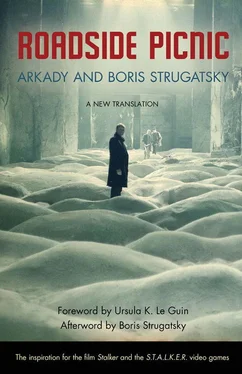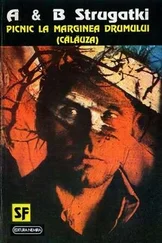He nods at me seriously: Don’t worry, I won’t chicken out. His nose looks like a plum—I really gave it to him. I carefully lower the emergency ropes, take one more look at the silver stuff, wave at Kirill, and start to climb down. I stand on the pavement, waiting for him to go down the other rope. “Take it slow,” I say. “Don’t rush. Don’t raise dust.”
We’re standing on the pavement, the boot is swaying next to us, the ropes are wriggling under our feet. Tender is sticking his head over the railings, looking at us with despair in his eyes. We have to go in. I tell Kirill, “Walk two steps behind me, keep your eyes on my back, and stay alert.”
And I go in. I stop in the doorway and look around. Damn, it sure is easier to work during the day! I remember how I lay in this same doorway. It was pitch black, the hell slime was shooting tongues of flame up from the pit, blue ones, like burning alcohol, and the most frustrating thing was that the damn flames didn’t even give off light but only made the garage seem darker. And now it’s a breeze. My eyes have gotten used to the gloom, I can see everything, even the dust in the darkest corners. And there really is something sparkling there, silver threads are stretching from the canisters to the floor—looks just like a cobweb. It might in fact be a cobweb, but better to stay away from it.
And here I screw up. I should have Kirill walk next to me, wait until his eyes get used to the dark, and show him this cobweb, point right at it. But I’m used to working alone—my eyes adjust to the light, and I don’t think about Kirill.
I step inside and head straight for the canisters. I squat by the empty; there aren’t any cobwebs stuck to it. I take one end of it.
“All right, grab hold,” I say, “and don’t drop it—it’s heavy.”
I look up at him, and my heart leaps into my throat—I can’t say a word. I want to yell Stop, don’t move! and can’t. And there probably isn’t enough time, anyway, it all happens so fast: Kirill steps over the empty, turns around, and his back goes right into the silver stuff. The only thing I can do is close my eyes. I feel weak all over, can’t hear a thing—just the sound of the cobweb tearing. With a faint crackle, like a regular cobweb, except louder, of course. I’m crouching there with my eyes closed, can’t feel my hands or my feet, then Kirill says, “Well, are we picking it up?”
“Let’s do it,” I say.
We pick up the empty and, walking sideways, carry it to the exit. The damn thing is heavy—it’s hard to carry even for the two of us. We go out into the sun and stop near the boot. Tender is reaching his paws toward us already.
“All right,” says Kirill, “one, two—”
“No,” I say, “wait. Put it down first.”
We put it down.
“Turn around,” I say.
He turns without a word. I look—there’s nothing on his back. I check this way and that. Still nothing. Then I look around and check the canisters. Nothing there either.
“Listen,” I say to Kirill, still looking at the canisters. “Did you see the cobweb?”
“What cobweb? Where?”
“Never mind,” I say. “The Lord is merciful.” Meanwhile, I think, Actually, that remains to be seen. “All right,” I say, “grab hold.”
We load the empty onto the boot and put it on its side so it won’t roll around. It’s standing there, looking lovely—spotless, new, the copper gleaming in the sun, the blue filling swirling slowly between the copper disks in cloudy streams. It’s now obvious that it isn’t an empty but a container, like a glass jar with blue syrup inside. We admire it for a bit, then clamber up onto the boot ourselves and without further ado are on our way back.
These scientists sure have it easy! First of all, they work in the daylight. And second, the only hard part is getting into the Zone—on the way back, the boot drives itself. It has this feature, a route memorizer, I guess, that takes the boot back along the exact same route it took here. We’re floating back, repeating each maneuver, stopping, hanging in the air a bit, then continuing; we pass over all the nuts, I could pick them up if I wanted to.
Of course, my novices immediately cheer up. They’re looking this way and that, their fear almost gone—only curiosity left, and joy that everything ended well. They begin to chatter. Tender is waving his arms and threatening to come right back into the Zone after dinner, to lay the path to the garage. Kirill takes me by the sleeve and starts explaining his gravicon-centrate to me—that is, the bug trap. Well, eventually I have to shut them up. I calmly explain to them how many idiots became careless with relief and kicked the bucket on the way back. Be quiet, I tell them, and keep your eyes open, or you’ll meet the fate of Shorty Lyndon. That works. They don’t even ask me what happened to Shorty Lyndon. Much better. In the Zone you can easily take a familiar route a hundred times and kick off on the hundred and first. We’re floating in silence, and only one thing is on my mind: how I’ll twist the cap off the flask. I keep visualizing how I’ll take the first sip, but the cobweb occasionally flickers before my mind’s eye.
In short, we make it out of the Zone, and they send us, still in our boot, into the delouser, or, as the scientists say, the sanitization hangar. They wash us in three boiling liquids and three alkaline solutions, smear some crap on us, sprinkle us with powder, and wash us again, then dry us and say, “Get going, guys, you’re free!” Tender and Kirill drag the empty along. People show up in droves—it’s hard to get through, and it’s so typical: everyone is staring and shouting greetings, but no one is brave enough to lend a hand to three tired men. Oh well, that’s none of my business. Nothing is my business anymore…
I pull the specsuit off and throw it on the floor—the sergeant lackeys’ll pick it up—then I head for the showers, since I’m soaked from head to toe. I lock myself in the stall, take out the flask, unscrew it, and attach myself to it like a leech. I’m sitting on the bench, my heart is empty, my head is empty, my soul is empty, gulping down the hard stuff like water. Alive. I got out. The Zone let me out. The damned hag. My lifeblood. Traitorous bitch. Alive. The novices can’t understand this. No one but a stalker can understand. And tears are pouring down my face—maybe from the booze, maybe from something else. I suck the flask dry; I’m wet, the flask is dry. As usual, I need just one more sip. Oh well, we’ll fix that. We can fix anything now. Alive. I light a cigarette and stay seated. I can feel it—I’m coming around. The bonus comes to mind. Here at the Institute that’s a given. I could go get the envelope this very minute. Or maybe they’ll bring it right to the showers.
I slowly undress. I take off my watch and look at it—my Lord, we were in the Zone for more than five hours! Five hours. I shudder. Yes, my friends, there’s no such thing as time in the Zone. Although, really, what’s five hours to a stalker? Nothing at all. You want twelve hours instead? Or maybe two whole days? When you don’t finish in one night, you stay in the Zone all day long facedown in the dirt; you can’t even pray properly but can only rave deliriously, and you don’t know if you are dead or alive. And the next night when you finish, you try to get out with the swag, except the guards are patrolling the borders with machine guns. And those toads hate you, they get no pleasure from arresting you, the bastards are scared to death that you might be contagious—they just want to shoot you down… And they are holding all the cards: go ahead and prove later that they killed you illegally. So there you are again, facedown in the dirt, praying until dawn, then until dusk, the swag lying beside you, and you don’t even know if it’s simply lying there or slowly killing you. Or maybe you’ll end up like Knuckles Isaac—he got stuck in an open area at dawn, lost his way, and wound up between two ditches—couldn’t go left or right. They shot at him for two hours, couldn’t hit him. For two hours he played dead. Thank God, they finally got tired of it, figured he was finished, and left. I saw him after that—I didn’t recognize him. They broke him, left only a shell of a man.
Читать дальше












